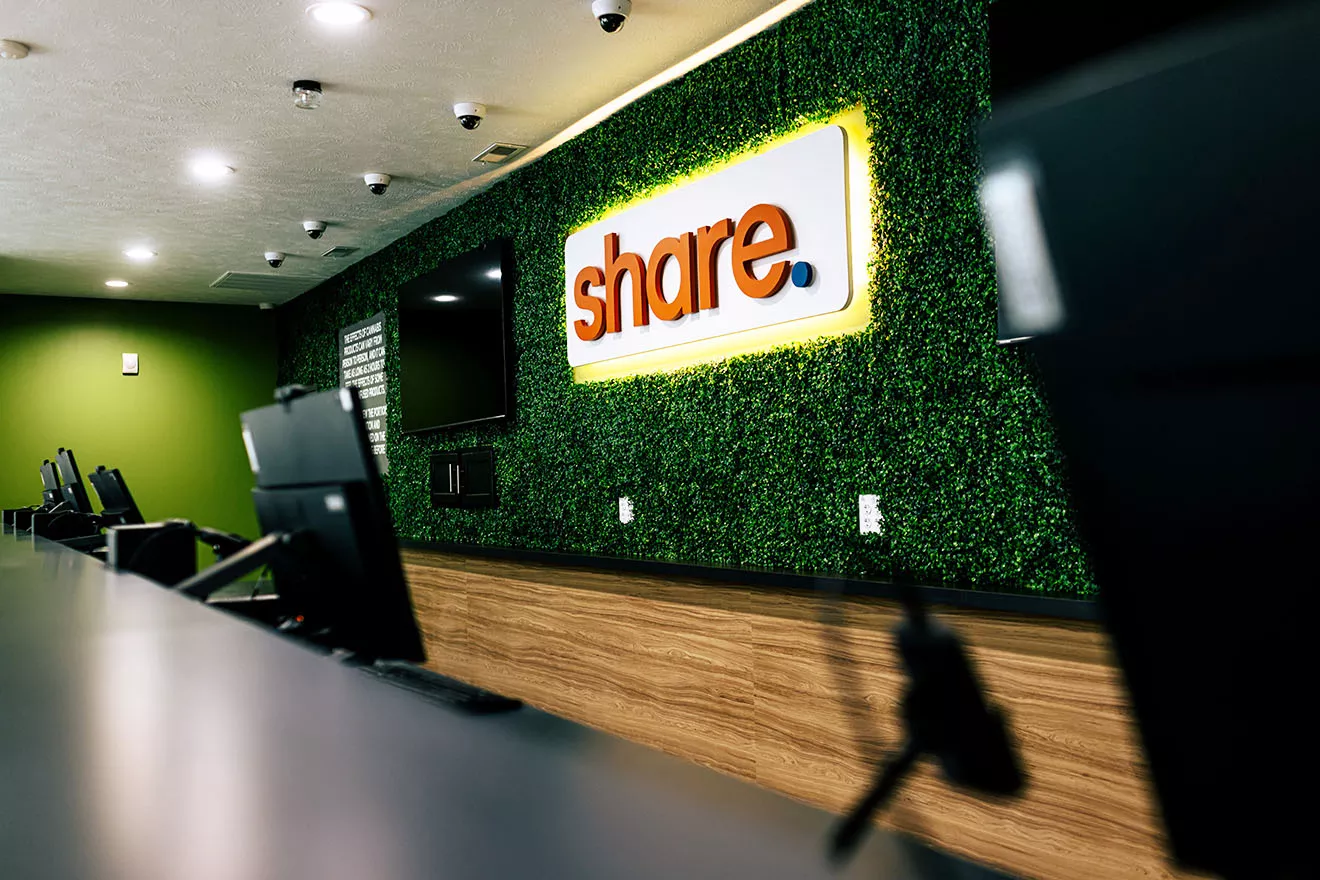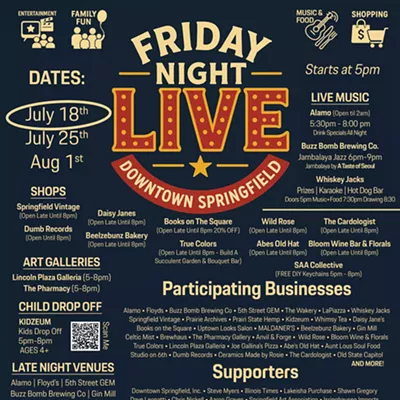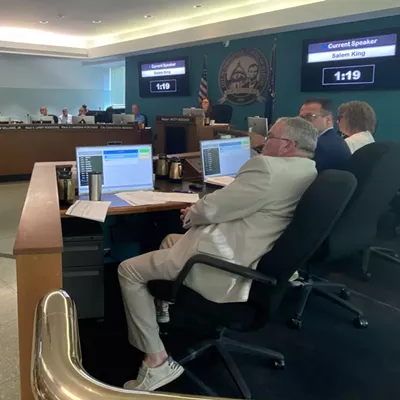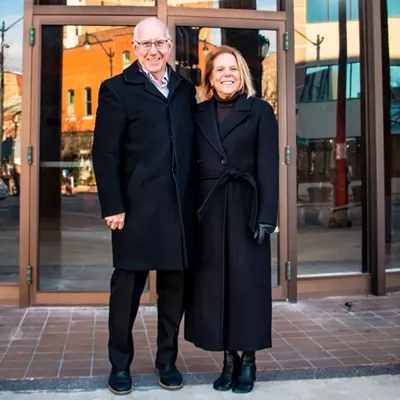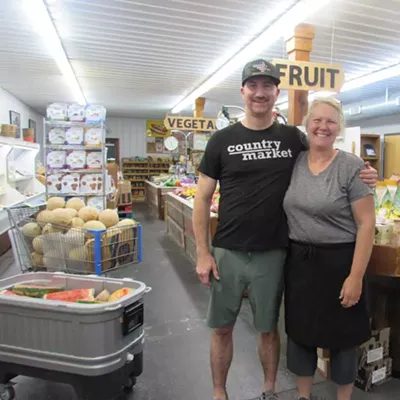Springfield entrepreneur Chris Stone sees a bright future
By David BlanchetteRecreational cannabis is a growth industry, and Springfield resident Chris Stone plans to take full advantage of the potential behind the once-banned substance.
“Eight percent of the population uses cannabis regularly, so how do we get to the other 92%?” Stone asked. “There is a large majority of people out there over 21 years of age that we could bring into the fold to use the product regularly.”
Stone operates Share, a new cannabis dispensary on South Sixth Street Frontage Road just north of the I-55 interchange in Southern View. The property owners from whom Share leases the building plan to develop an adjacent 25,000-square-foot cultivation center, allowing the sale of locally produced cannabis products in the Share dispensary and throughout the state.
Around year’s end, Stone plans to have proprietary cannabis-infused beverages on the market that he hopes may replace beer or wine for many recreational drinkers. Stone sees these and other cannabis products taking a substantial market share from other beverage industries.
“When I entered the cannabis market in 2013, that was my strategy all along, to move people from alcohol to cannabis-infused beverages,” Stone said. “The primary reason is that it doesn’t cause a hangover, and it’s also a lot healthier for your body than alcohol.”
Stone is very familiar with the alcohol industry with which he plans to compete. Stone began his professional career as a government affairs director for a Chicago-based wine and liquor distributor and worked in that industry for several years, taking an active role in legislation that affected alcoholic beverage businesses.
Stone learned a lot from the alcohol industry that he is using in the cannabis business.
“There are always new alcohol products coming into the market and you’ve got to be able to pivot and to adjust,” Stone said. “Learning from the way they market and distribute alcohol, the way the regulations work, has been a great base to develop a business model that works for cannabis.”
After a stint as a consultant, Stone next found himself in the center of the new video gaming industry in Illinois. In 2008 he founded Lucy’s Place, Illinois’ first chain of entertainment video gaming cafes, and built the chain into the state’s largest grossing video gaming/entertainment company.
His years in the nascent video gaming industry taught Stone some valuable lessons that he was able to use when he entered the cannabis business. The most important lesson was, don’t expect to turn a profit right away.
“We were the first video gaming parlors in the state, and the state forced us to build out the facilities and actually staff them with employees even though we had no games to actually use,” Stone said. “So, we sat there for almost nine months and burned a bunch of cash waiting for the state to allow us to put the machines in place.
“Knowing how the state operated on that, I told the cannabis investors that we were probably going to burn cash for the first year if they were going to operate the same way they did with video gaming,” Stone said. “We might not be able to get product, we might not be able to get open for a while even after we build something out. So we incorporated that into our business model and it was definitely the right move.”
So Stone had his eyes fully open when he founded HCI Alternatives, an Illinois cannabis dispensary chain, in 2014 and served as its chief executive officer until it merged with Ascend Wellness in 2018. He was the CEO of Ascend Illinois until 2020 and continues to serve as a strategic adviser to Ascend Wellness Holdings, one of the largest cannabis systems in the United States. In these capacities, Stone helped to draft many of the initiatives contained in the Illinois General Assembly’s bills that legalized medical and recreational use cannabis.
Those recent years were an exciting, but challenging, time to be involved in the process of turning pot into legitimate profit.
“With any new program there are going to be glitches. The application process has been an absolute bear, and COVID-19 didn’t help that cause,” Stone said. “The way the previous administration implemented cannabis on the medical side, they really did a number in terms of slow-rolling it out. This prevented businesses like ours from being able to build the business at the very beginning.
“But the businesses and the state worked together to try to iron out some things, including some of the initial unnecessary regulations,” Stone said. “And we’ve grown together the last seven and a half years into a better program.”
But it’s not easy money for the cannabis industry. Stone said the profit margins aren’t typical of a normal business because the same tax deductions are not available to the cannabis industry, which is legal in Illinois and several other states but is still deemed illegal by the federal government.
“I tell people that if you’re going to get into this business, the time you make money is when you sell it,” Stone said. “You can make money as you operate it but you need to operate very, very efficiently. A lot of the places in the state don’t operate efficiently, and that’s why you see that most of them have sold their businesses to bigger entities.”
Stone and his fellow investors had efficiency in mind when developing Share in Southern View. Required security precautions and systems account for one-third of the operational costs of the business but there are other areas where the profit margins could be increased, from new and local product development to the customer marketing and purchase experience.
Stone also had to be savvy about where he chose to locate his new cannabis dispensary. Stone purchased a license from a group that had won one in the latest state dispensary lottery and determined that one of the main entry points to the Springfield area, the Sixth Street corridor, would be an ideal dispensary location. That meant interacting with the Village of Southern View and working with village officials to get some laws changed.
“Education over the past 10 years has reduced the stigma of cannabis and I think that is why more communities are willing to work with cannabis companies,” Stone said. “Plus you have substantial tax revenues for the municipalities. The state has seen that this is an actual, viable industry that they are reaping some significant revenues from in property taxes, sales taxes and payroll taxes.”
The Village of Southern View is pleased to welcome Share to the community, and village attorney Don Craven agreed that working with an experienced entrepreneur like Stone made the whole experience easier.
“The process of making necessary changes to village code went very smoothly, and the dispensary representatives were easy to work with,” Craven said. “This was the first experience we had with anybody in the cannabis industry. I think if you compare the way that Southern View approached it with the way the city of Springfield approached it, Southern View was willing to accommodate reasonable requests.”
The Illinois Department of Transportation plans improvements along Sixth Street between the I-55 interchange and Stevenson Drive. Share is located along the Sixth Street frontage road and therefore will be within a stone’s throw of those Sixth Street improvements. Craven said the village thinks Share is the perfect business to drive retail traffic along the improved Sixth Street corridor, and Share thinks that their local ownership will allow them to fully meet the village’s optimistic expectations.
“The dispensary operation and the planned cultivation center are locally owned by investors, including me,” Stone said. “The benefit to the local community is full-time, good paying jobs, plus if you are making and selling cannabis here it will be cheaper for people here to buy it.”
“The Springfield area is interesting, it’s a relatively big city but it feels like a small town,” Stone said. “People are very parochial here so when you say locally owned it really does resonate here a lot more than in some other places.”
Stone also thinks the Springfield area will be a good place to produce and sell new cannabis-based products. Besides Share’s new recreational beverage line, Stone envisions more products such as lotions, salves or sprays for potential customers who don’t want to smoke, vape or eat cannabis. He predicts that cannabis products will be served to over-21 customers in taverns and restaurants in the not-so-distant future.
“I think there will be a big revolution in terms of marketing that’s going to take people not only away from alcohol, but away from energy drinks because certain cannabis strains provide you with energy,” Stone said. “I can see people moving away from coffee or soda as well.”
Stone’s entire career has been spent in alcohol, gambling and cannabis, and he views his work as an opportunity to open people’s eyes about these so-called sin industries.
“I start out by saying, ‘Let’s take morality out of the picture.’ That kind of disarms people, because once you take morality out of alcohol, gambling or cannabis, what are you left with?” Stone said.
“Then you have a better chance of educating them about what the product really is and how it works, and we have a lot of science behind cannabis.”
Stone didn’t like video gambling but had to learn it for his involvement in the industry. He is also “not a huge cannabis user,” but will welcome products like Share’s new beverage line “that does not have a cannabis smell or aftertaste,” he said.
In addition to his involvement with Share, Stone founded and continues to operate a real estate development company and a construction/property management company that owns and manages more than 700,000 square feet of commercial office real estate in three states. Stone and his wife, Erin, have six children and reside in Springfield.
Stone is open and frank when discussing the cannabis business and his current and future plans related to the industry. But no matter whom he talks to, there seems to be one question that is on everyone’s mind.
“Yes, ‘Stone’ is an appropriate name for the cannabis industry, that’s for sure,” Stone said with a chuckle. “Not only that, but my office phone number used to end with the numbers ‘420,’ which for years has been slang for cannabis consumption. I didn’t orchestrate my phone number or my name, they just happened.”

